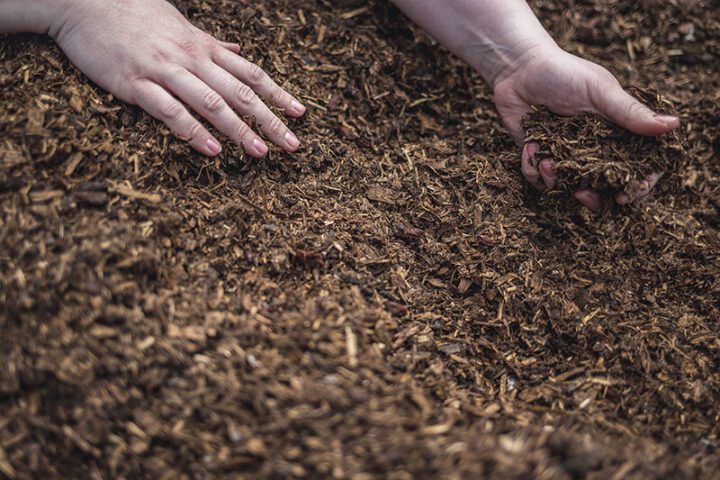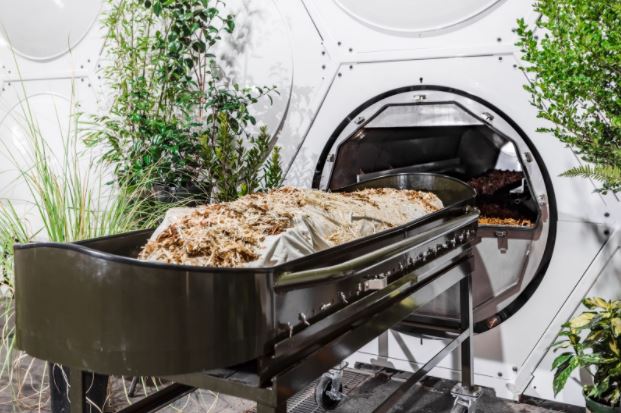A Trusted Leader in Ecological Death Care
Recompose is a licensed, full-service funeral home in Seattle specializing in human composting.
Welcome
to Recompose

Plan Ahead with Recompose
Prearranging for your future human composting is simple and straightforward with our prepaid funeral plan, Precompose. Starting with plans as low as $100 per month, you’re able to plan ahead without risk and secure today’s price, even if the price goes up.
Schedule a Tour
Visit the world’s first human composting company! You’ll see our ceremony and community spaces, and part of the vessel array where soil transformation takes place. You’ll learn about our human composting model including the design, development, and legalization process.
Cultivate Change
Recompose and a groundswell of people are working to transform the funeral industry. Learn about legalization efforts and wins, and find ways to get involved to expand human composting.
From Our Clients
“I just wanted to say thank you for creating such a beautiful ceremony to send off my mom yesterday. It was moving, quiet and meaningful. Members of the family called me after to say that the experience was healing for them in ways they had not expected.”
— Michelle M
“The love and care that is shown by the team with every step of the process is exemplary, supportive, respectful, and compassionate. What a wonderful and natural way to handle death and offering back the body to the earth.”
— Katherine D
“I was impressed with how thoughtfully they created a welcoming, respectful and beautiful space, and the care going into the whole process. Katrina and her team genuinely offer their best and want that to be so for everyone.”
— Bonnie B
Why Recompose

Exceptional Services
With decades of combined experience, our Services team is knowledgeable and responsive. They’re available to answer transportation questions, provide information on soil options, and help with logistics and ceremony planning. The transformation into soil will be tailored to each individual and managed by the leading experts in human composting.
Clear and Ethical Pricing
Recompose operates with integrity and clarity and will never try to upsell you. We strive to be straightforward about our pricing and services so you are informed and know what to expect. While human composting is innovative and new, we aim to keep our costs comparable to other death care options.
Give Back to the Earth
Human composting uses 87% less energy than traditional burial or cremation. By choosing Recompose, you will save one metric ton of carbon from entering the environment. Recompose partners with conservation organizations, so you can choose to donate soil to nourish and revitalize the land.
Business for Good
Recompose is a public benefit corporation committed to growing with integrity and purpose. We are leading legislative advocacy across the country to expand human composting access to all. By choosing Recompose, you support a community-centered, values-driven business working for lasting social and environmental impact.
FAQs
How it works
-
Human composting is the transformation of a human body into soil. Recompose places each body into a stainless steel vessel along with wood chips, alfalfa, and straw. Microbes that naturally occur on the plant material and on and in our bodies power the transformation into soil.
Over the next five to seven weeks, the body inside the vessel breaks down thanks to the natural action of the microbes. The soil is then removed from the vessel, screened for non-organic items such as hip replacements or stents, and allowed to cure for an additional three to five weeks.
Once the process is complete, the soil can be used on trees and plants, or donated to conservation efforts. Each body creates about one cubic yard of soil.
Watch Recompose Founder and CEO, Katrina Spade, describe how human composting works during her 2023 talk at the End Well Conference.
Explore more
Check out our infographic that shows the steps of the Recompose human composting process.
-
Bones and teeth do not fully break down in the human composting process due to their mineral composition. Similar to other forms of death care, equipment is needed to reduce the bones.
Microbes do the primary work of human composting. By controlling the ratio of carbon, nitrogen, oxygen, and moisture, human composting creates the perfect environment for microbes and beneficial bacteria to thrive. To create that environment, Recompose uses a mixture of plant materials carefully calibrated and tailored to each body.
Recompose staff rotate each vessel at several points during the process to ensure thorough aeration and exposure to resources for the microbes.
Bones are reduced to a fine powder by equipment after the soil is removed from the Recompose vessel. Staff also screen for non-organics such as implants, which are recycled whenever possible. The reduced bone is added back to the compost to help balance the compost nutrients and make minerals available to plants. It continues to break down and return to the environment over time.
Recompose follows all compost-testing regulations put forth by the Washington State Department of Licensing and the Board of Health. The pH range of Recompose compost is usually between 6.5 and 7, which is ideal for most plants.
Learn more about the human composting process.

Sample compost, not created from a human body, that has been through our composting process. -
The entire human composting process generally takes between eight to twelve weeks. Our staff will communicate timing and key moments throughout the process. Each body spends about five to seven weeks in a Recompose vessel, then the soil is transferred to an aerated bin to cure for an additional three to five weeks.
Recompose follows all compost-testing regulations put forth by the Washington State Department of Licensing and the Board of Health. The pH range of Recompose compost is usually between 6.5 and 7, which is ideal for most plants.
Watch Recompose Founder and CEO, Katrina Spade, describe timing in the human composting process during her 2023 talk at the End Well Conference.
Explore more
Check out our infographic that shows the steps of the Recompose human composting process.
-
At Recompose, the human composting takes place in a device we call a vessel. It is a steel cylinder, 8 feet long and 4 feet tall. Each vessel rests inside of a hexagonal frame.
Each body is placed into the vessel on a bed of wood chips, alfalfa, and straw. Additional plant material is added as a blanket to cocoon the body within the vessel. The temperature inside the vessel rises over time as the microbes work, and is sustained over 131 degrees Fahrenheit for a minimum of 3 continuous days.
Over the next five to seven weeks, the body breaks down thanks to the natural action of aerobic microbes. Recompose staff monitor the temperature inside the vessel to determine when a rotation is needed to increase oxygenation and expose additional energy to the microbes. Once the microbes have finished their work, the soil is removed from the vessel and placed into a curing bin, where it is aerated for three to five weeks.
Below is a photo of a Recompose vessel and cradle.

-
Human composting is a more environmentally-friendly option than burial or cremation. This is because the process does not use fossil fuel like cremation, does not require the casket and cemetery resources of burial, and sequesters carbon as soil is created. As the nutrients in the compost are used over time by the plants in contact with it, the impact of a person’s choice for human composting continues to expand exponentially.
To measure the environmental impact of human composting, expert Dr. Troy Hottle developed a scientific model to compare cremation, conventional burial, green burial, and human composting. The model showed that human composting and green burial perform far better than cremation or conventional burial at reducing carbon. The research showed that between .84 and 1.4 metric tons of carbon dioxide will be saved each time someone chooses human composting.
Soil Information
-
The Recompose human composting process creates approximately one cubic yard of soil per body which is roughly 3 x 3 x 3 feet. This amount fills the bed of most pickup trucks and weighs approximately from 500 pounds to over 1,000 pounds. The process begins with three cubic yards of plant material.
Families can take some or all of the soil home once the process is complete, and donate what does not go home to conservation efforts. Learn more about how to consider your soil options.
-
The Recompose process creates approximately one cubic yard of soil—approximately 500 pounds to over 1,000 pounds. Soil tests indicate compost created by the Recompose process is appropriate for established shrubs, trees, house plants, and flower gardens; use on tender annuals should be avoided.
Analysis indicates compost that is good for use on plants. The pH range of Recompose compost is usually between 6.5 and 7, which is ideal for most plants. Electrical conductivity is moderate, indicating the presence of soluble (plant-available) ions. The nitrogen-phosphorus-potassium-sulfur content is balanced, providing good nutrient content with a good supply of macronutrients.
Respiration test results indicate Recompose compost is at “Very Stable” levels, indicating that most of the “fast pool” of sugars have been used up by microbes and nutrients are stabilized. Nitrate content is high, indicating aerobic status and advanced decomposition. Bioassay does show relative immaturity, so we recommend use as a mulch and at lower concentration around roots of young plants.
Recompose follows all compost-testing regulations put forth by the Washington State Department of Licensing and the Board of Health.
-
Recompose partners with conservation organizations, so you can choose to donate some, or all, of the soil to nourish and revitalize the land. The donated soil supports conservation projects like tree nurseries, erosion repair, and replanting native plants after the removal of invasive species. The nutrients that were once the body return to the earth.
Read our article How to Consider Your Soil Options for more information.
Planning & Pricing
-
Choosing our human composting services is possible in most places outside of Washington State. Most clients that come to us from another state work with a funeral home in their area to arrange for transport. This funeral home will pick up a body at the place of death and arrange for transport to Recompose.
When you contact a funeral home, we suggest starting the conversation by saying something like, “I am looking to have my loved one’s body transported to the Seattle area. I have chosen a funeral home called Recompose to handle their death care services. Can you help me make arrangements?”
Families can also transport their person to Recompose in their personal vehicle with the correct permits. If you are interested in this option, please contact us for guidance.
Our Services team is here to support you and can discuss options, find a transporting funeral home, and help arrange for transport. Please contact our staff at (206) 800-8733 or services@recompose.life. Our article, Arranging for Transportation, also has information to help you.
Please note: Bodies that come to Recompose must not be embalmed. While most funeral homes are experienced with transporting bodies, they may not yet have heard of human composting or have experience with this kind of transport.
-
You can choose Recompose for human composting from most states. You can contact our staff at (206) 800-8733 or precompose@recompose.life and we can help you arrange for transport.
Most clients that come to us from another state work with a funeral home in their area to arrange for transport. This funeral home will pick up a body at the place of death and arrange for transport to Recompose. When you contact a funeral home, we suggest starting the conversation by saying something like, “I am looking to have my body transported to the Seattle area. I have chosen a funeral home called Recompose to handle my death care services. Can you help me make arrangements?”
In most instances, families can also transport their person to Recompose in their personal vehicle with the correct permits. If you are interested in this option, please contact us and we’re happy to help.
Please note: Bodies that come to Recompose must not be embalmed. While most funeral homes are experienced with transporting bodies, they may not yet have heard of human composting or have experience with this kind of transport. If you have any questions or need help finding a transporting funeral home, Recompose staff can help you.
Our article, How to Arrange for Transport to Recompose, also has information to help you.
-
The average cost of conventional death care can vary widely depending on various factors such as the location, specific services chosen, and individual preferences.
Conventional Death Care
According to the National Funeral Directors Association, the median cost of a funeral with cremation in 2021 in the United States was $6,970, and the median cost of a funeral with viewing and burial was $7,848.
It is important to note that the median burial cost does not include a plot, headstone, or any other cemetery costs associated with a burial. Those additional expenses can often double the cost of a traditional burial. It is also important to note that you can often find a more economical rate for a direct cremation. The best thing to do is ask.
Our Approach
While human composting is innovative and new, Recompose aims to keep our costs comparable to other death care options. Our $7,000 price includes empathetic care and guidance from our Services team from the time of death through transformation into soil eight to twelve weeks later. Learn more about our services here and find a list of current pricing for all services in our General Price List.
We are committed to bringing ecological death care to as many people as possible. This includes providing our services at a subsidized rate to individuals who could not otherwise afford to pay our full price through our Community Fund.
Recompose operates with integrity and clarity and will never try to upsell you. We strive to be straightforward about our pricing and services so you are informed and know what to expect.
-
Recompose’s price for human composting does not include a ceremony, flowers, newspaper obituaries, clergy honorariums, transportation of the body outside our service area, or additional transport for autopsies.
You can see a full list of additional items we offer in our General Price List. The GPL is a document the Federal Trade Commission’s Funeral Rule requires funeral homes to have available in the interest of protecting consumers.













